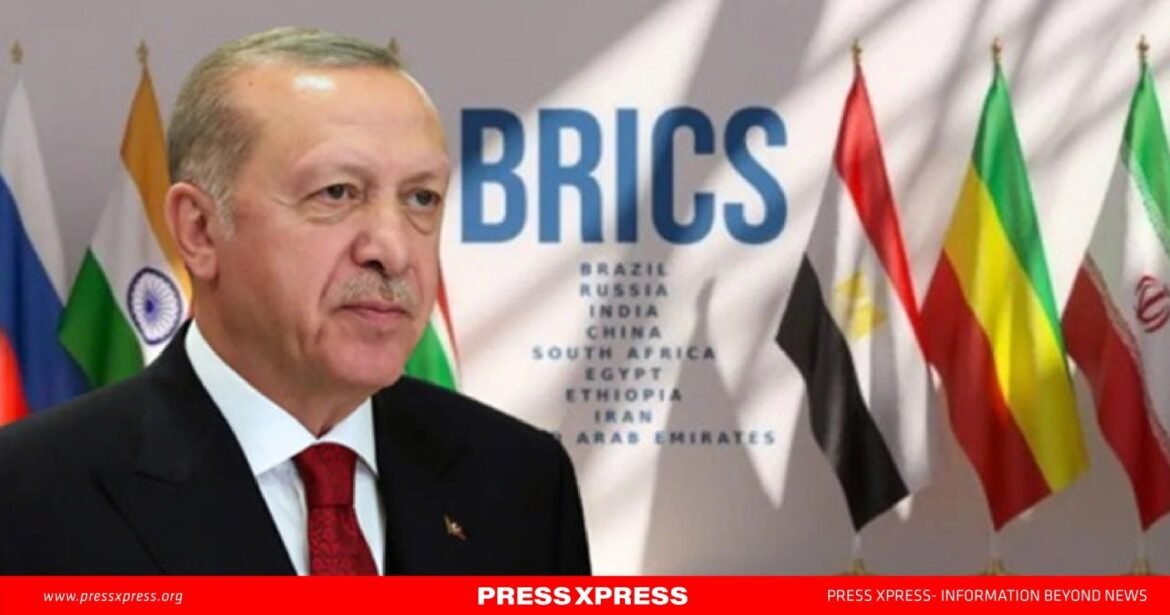Turkey, a NATO member since 1952, has long aligned itself with Western powers, particularly the U.S., to counter Soviet threats during the Cold War. However, under President Recep Tayyip Erdogan’s leadership since 2003, Turkey has pivoted, forging new alliances that reflect a changing global landscape.
This shift is highlighted by Turkey’s bid to join BRICS, a bloc comprising Brazil, Russia, India, China, and South Africa—countries that collectively represent some of the world’s largest emerging economies.
Turkey’s Economic Motive for BRICS
The economic rationale behind Turkey’s BRICS ambitions is clear. Ankara is keen to diversify its trade and investment networks as the global economic center shifts towards non-Western nations. In the last decade, Turkey’s trade with BRICS nations surged, growing from $74.3 billion in 2013 to $121.3 billion in 2023. Notably, Russia and China account for the majority of this trade, with a combined total of $105 billion in 2023, comprising 17% of Turkey’s external trade.

Russia remains a crucial partner for Turkey, particularly in energy. As Turkey’s primary supplier, Russia has enabled significant infrastructure projects like the Akkuyu Nuclear Power Plant, built by the Russian state firm Rosatom. Additionally, Russian tourists play a vital role in Turkey’s tourism sector, with 6.3 million Russians visiting in 2023. China, too, has emerged as a key economic partner. Turkey’s “Far Countries Strategy,” launched in 2022, seeks to boost trade relations with large economies in the Global South, including China, India, and Brazil. A recent $1 billion investment from Chinese electric vehicle manufacturer BYD to build a plant in Turkey underscores the deepening ties between the two nations.
A Geopolitical Realignment
Beyond economic gains, Turkey’s interest in BRICS signals a broader geopolitical shift. Turkey has often found itself at odds with its traditional Western allies, especially on issues such as the conflict in Syria, Russia’s invasion of Ukraine, and Israel’s war on Gaza. Ankara’s alignment with BRICS members on these and other issues suggests that Turkey sees value in cultivating relationships with countries that share similar geopolitical views.

Erdogan’s government, for instance, maintains closer ties with Moscow, despite Russia’s invasion of Ukraine, than most NATO members. On Gaza, Turkey’s stance is more aligned with the BRICS countries, particularly regarding the humanitarian crisis and its criticism of Israel’s actions. This divergence from Western positions strengthens Turkey’s case for membership in BRICS, a group increasingly positioning itself as a counterweight to Western-dominated global institutions like the International Monetary Fund (IMF) and the World Bank. BRICS’ recent expansion to include Iran, the United Arab Emirates, Ethiopia, and Egypt further enhances its geopolitical value to Turkey. As BRICS’ influence grows, Turkey sees membership as a way to deepen ties with like-minded nations in the Global South and expand its influence on the international stage.
The EU Factor: A Dead-End Path
Turkey’s longstanding frustrations with the European Union (EU) also play a crucial role in its pivot to BRICS. For decades, Turkey pursued EU membership, which provided a framework for political and economic reforms in the early 2000s. However, relations have soured, with EU officials citing democratic backsliding and concerns over the rule of law in Turkey as reasons for halting accession talks. The refugee crisis and the EU’s handling of a migration deal with Turkey further exacerbated tensions.

From Turkey’s perspective, the EU’s approach is shortsighted, lacking a strategic vision for long-term cooperation. Notably, frustration with the EU is not limited to Erdogan’s government; opposition parties and civil society groups in Turkey have also voiced disappointment with the EU’s “kicking the can down the road” strategy regarding membership. This stagnation has pushed Turkey to seek alternatives, with BRICS offering a platform for expanding trade, securing investments, and strengthening global partnerships outside the EU’s influence.
What’s at Stake?
Turkey’s balancing act between East and West, epitomized by its NATO membership and its BRICS ambitions, presents a delicate challenge. The U.S. has repeatedly cautioned Turkey about violating sanctions against Russia and Hamas. However, Ankara knows that too much pressure from Washington could further strain relations with a key Middle Eastern ally.
Turkey’s aspirations to join BRICS underscore a broader shift in its foreign policy, reflecting both economic pragmatism and a desire for greater autonomy on the global stage. How this plays out will shape Turkey’s role in the emerging multipolar world and its continued relevance within NATO.
Can BRICS Challenge Western Dominance?
BRICS represents over 40% of the global population and about 25% of global GDP. Trade among BRICS nations surged from $74.3 billion in 2013 to $121.3 billion in 2023, with the China-Russia partnership accounting for $105 billion of that. This growth shows BRICS’ potential, but the bloc faces significant challenges.

Efforts to reduce reliance on the U.S. dollar—especially pushed by Russia and China—have seen limited success. The dollar still makes up 58.4% of global reserves, and BRICS’ New Development Bank (NDB), created to counter Western financial institutions, lent just $8-10 billion last year compared to the World Bank’s $73 billion.
Internal divides also hinder BRICS’ ambitions. While Russia and China push for de-dollarization, India and Brazil are wary of aligning too closely with China, especially if it means replacing dollar dominance with the renminbi.
BRICS has economic clout, but internal divisions and reliance on the dollar mean it still faces a long road to truly rival Western-led systems.


